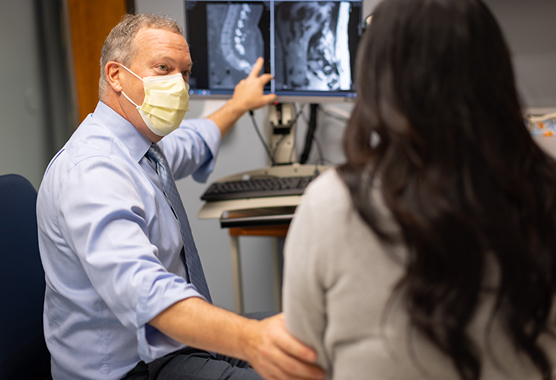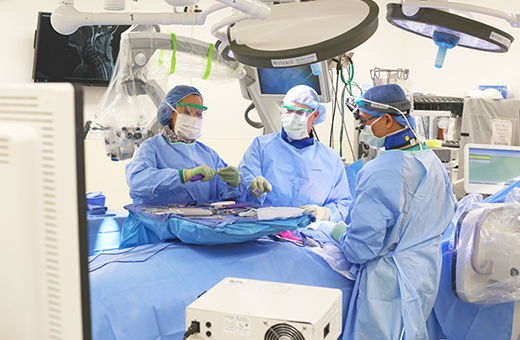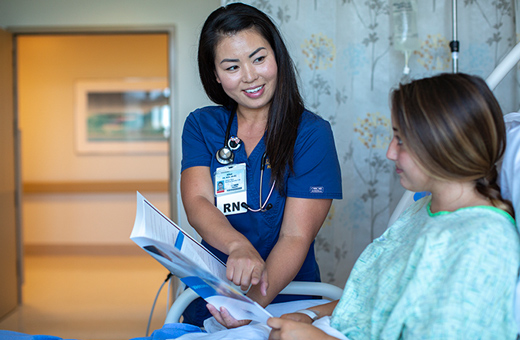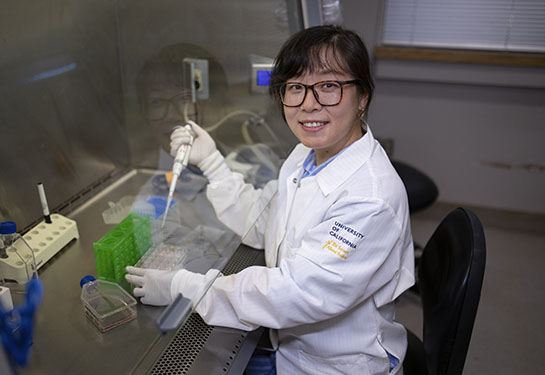Spine Neurosurgery
UC Davis Health offers advanced spine neurosurgery to help you manage back pain, neck pain, and mobility issues. We offer personalized, compassionate care to treat a range of spine conditions.
Medically reviewed by Richard Price, M.D. on Aug. 25, 2025.

Advanced Treatment With Neurological Spine Surgery
You want the best care possible when you have a back condition. Our spine neurosurgery team is part of the UC Davis Spine Center and our nationally ranked Departments of Neurology and Neurological Surgery.
Our comprehensive approach brings together specialists in spine neurosurgery, orthopaedic surgery, pain medicine, physical medicine and rehabilitation, and neuroradiology. Our experts work together to diagnose and treat your condition. You can benefit from the latest technology and techniques when you receive treatment in our outpatient surgery center and clinic.
As part of the collaborative UC Davis Spine Center team, our neurosurgeons co-lead one of the most active spine clinical trials programs in the country. Faculty members are part of an international effort to improve care for spinal cord injury patients.
Types of Spinal Surgery
The neurosurgery specialists at UC Davis Spine Center treat spinal disorders when medication and therapy aren’t effective. We are experts at performing the full range of spinal surgeries. We treat spine tumors, degenerative spine conditions, spinal stenosis, spine trauma, scoliosis and other conditions. Types of surgery include:
Decompression Surgery
Discectomy, foraminotomy, and laminectomy are common decompression surgeries. These procedures relieve pressure on your spinal cord or the nerves in your neck or back. Surgeons remove bone spurs and disc material to widen the space around your nerves to relieve pain.
Minimally Invasive Surgery
Minimally invasive neurosurgery procedures have smaller incisions and are less damaging to tissue. Patients recover faster. We use endoscopes, radiofrequency, and spinal cord stimulation to relieve nerve pressure and block nerve signals in your back.
Fusion Surgery
If you have a damaged disc in your spinal column, your neurospine surgeon can replace it with an artificial disc to preserve your mobility. Vertebrae can be fused with bone grafts and metal devices to limit painful movement.
Motion Sparing Surgery
Motion-sparing surgery is a type of minimally invasive spinal surgery that relieves pain and pressure by restoring spinal motion instead of restricting it. Unlike traditional fusion, which permanently locks vertebrae, motion-sparing techniques such as artificial disc replacement or dynamic stabilization allow for a controlled range of flexibility and mobility.
Request an Appointment
As Sacramento's No. 1 hospital, you'll benefit from unique advantages in primary care and specialty care. This includes prevention, diagnosis and treatment options from experts in 150 specialties.
Referring Physicians
To refer a patient, submit an electronic referral form or call.
800-4-UCDAVIS
Patients
Call to make an appointment.
Consumer Resource Center
800-2-UCDAVIS
When you have surgery at UC Davis Health, you have a comprehensive surgical team to coordinate your care. The team members are available to answer your questions and guide you through every step of the process.
-

Before Surgery
Anticipate a call from the hospital two to three days before your surgery. Your care coordinator will provide your arrival time and discuss limits on your food, drink and medications. You may be directed to use a special soap to bathe.
-

At the Hospital or Outpatient Surgery Center
Learn what to expect during your stayarrow_forwardWhen you arrive, check in at the information center in the main lobby. You and your support person or people will go to the surgery waiting room. You’ll move through the pre-operation room, surgical suite, and post-anesthesia care unit. If your procedure requires an overnight stay, we’ll assign a hospital room to you.
-

After Surgery
Learn more about your care at homearrow_forwardYour care team members will monitor your recovery after surgery. They will discuss follow-up care and any modifications to your food and activity when you go home.
Home Care After Spinal Surgery
Your physician will outline important steps to follow at home to aid your recovery. Your home care will include:
Activity and Nutrition
Your body needs extra nutrition to heal after surgery. Eat more calories and protein, such as egg whites, fish, poultry, legumes, protein shakes and tofu. Make sure you’re getting enough calcium and vitamin D3. Start a walking regimen as directed and gradually increase time and distance.
Pain Management
Pain is natural after surgery. It should gradually improve. Take any prescription medication you receive as directed. Talk to your physician about appropriate over-the-counter pills.
Incision Care
Change the dressing on an incision as directed by your care team. Do not apply antibiotic ointment, cream, or lotion while it’s healing. Once it’s closed, you should keep it clean, dry, and open to the air.
When to Contact Your Neurosurgeon
Call your physician right away if you experience unusual symptoms. These include chest pain, fever, or weakness. If you notice foul discharge, increasing pain, redness or swelling at the incision, address it promptly.

Ranked among the nation’s best hospitals
A U.S. News & World Report best hospital in cardiology, heart & vascular surgery, diabetes & endocrinology, ENT, geriatrics, neurology & neurosurgery, and pulmonology & lung surgery.

Ranked among the nation’s best children’s hospitals
U.S. News & World Report ranked UC Davis Children’s Hospital among the best in pediatric nephrology, orthopedics*, and pulmonology & lung surgery. (*Together with Shriners Children’s Northern California)

Ranked Sacramento’s #1 hospital
Ranked Sacramento’s #1 hospital by U.S. News, and high-performing in aortic valve surgery, back surgery (spinal fusion), COPD, colon cancer surgery, diabetes, gynecological cancer surgery, heart arrhythmia, heart failure, kidney failure, leukemia, lymphoma & myeloma, lung cancer surgery, pacemaker implantation, pneumonia, prostate cancer surgery, stroke, TAVR, cancer, orthopedics, gastroenterology & GI surgery, and urology.

The nation’s highest nursing honor
UC Davis Medical Center has received Magnet® recognition, the nation’s highest honor for nursing excellence.

World-class cancer care
One of ~59 U.S. cancer centers designated “comprehensive” by the National Cancer Institute.

A leader in health care equality
For the 13th consecutive year, UC Davis Medical Center has been recognized as an LGBTQ+ Healthcare Equality Leader by the educational arm of America’s largest civil rights organization.

